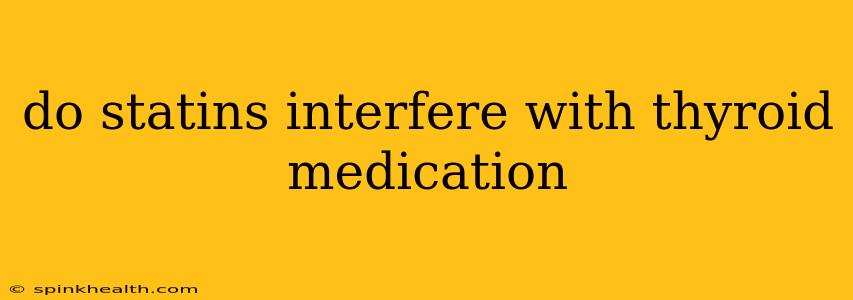Do Statins Interfere With Thyroid Medication? A Deep Dive into Potential Drug Interactions
The question of whether statins interfere with thyroid medication is a common concern for millions taking both types of drugs. It's a valid worry, as both statins (used to lower cholesterol) and thyroid medications (like levothyroxine) are crucial for maintaining overall health. Let's unravel this complex relationship and address the specific questions many people have.
Can Statins Affect Thyroid Hormone Levels?
This is the million-dollar question, and the short answer is: potentially, yes, but usually not significantly. The interaction isn't a direct, always-present conflict. Instead, it's more nuanced and depends on several factors. Some studies suggest that certain statins, particularly those in the higher dosage ranges, might slightly reduce the absorption of levothyroxine. This effect is usually modest, and many people experience no noticeable changes in their thyroid hormone levels. However, the possibility exists, and vigilance is key.
Think of it like this: your body is a complex ecosystem. Introducing a new drug, like a statin, can sometimes subtly alter the balance. While it won't necessarily block levothyroxine completely, it can subtly interfere with how efficiently your body processes it. This is why regular monitoring is so important.
What Are the Symptoms of a Statin-Thyroid Interaction?
Identifying a potential interaction can be tricky because symptoms often mimic typical hypothyroidism (underactive thyroid). These symptoms could include:
- Fatigue: Feeling unusually tired or sluggish.
- Weight gain: Noticeable increase in weight without changes to diet or exercise.
- Constipation: Changes in bowel movements, becoming less frequent.
- Depression: A persistent low mood or feelings of hopelessness.
- Cold intolerance: Feeling cold even in moderately warm environments.
- Dry skin: Skin appearing dry, flaky, or itchy.
It's crucial to remember that these symptoms are also common in various other conditions. Don't jump to conclusions if you experience one or two; always consult your doctor.
Should I Stop Taking My Statin or Thyroid Medication?
Absolutely not, without consulting your doctor! Both statins and thyroid medication are often essential for managing serious health conditions. Stopping either abruptly can have dangerous consequences. The key is proactive monitoring and open communication with your healthcare provider.
How Can I Minimize Potential Interactions?
Your doctor is your best resource, but here are some general guidelines:
- Timing: Taking levothyroxine at least four hours before or several hours after your statin can help maximize absorption. Discuss the optimal timing with your doctor or pharmacist.
- Regular Blood Tests: Regular thyroid function tests (TSH, T3, T4) are crucial to monitor your thyroid hormone levels while taking both medications. This allows for timely adjustments to your levothyroxine dosage if needed.
- Open Communication: Keep your doctor informed about all medications, supplements, and over-the-counter drugs you're taking. This transparency helps them assess potential interactions and make informed adjustments to your treatment plan.
Does it matter which statin I take?
While some studies suggest a slightly higher potential for interaction with certain statins, the evidence isn't conclusive enough to recommend one type over another based solely on this factor. Your doctor will consider your overall health profile and cardiovascular risk when prescribing the most appropriate statin.
What should I do if I suspect an interaction?
If you experience any concerning symptoms, such as those listed above, contact your doctor immediately. Do not adjust your medication dosage on your own. Your physician can perform necessary blood tests to assess your thyroid hormone levels and adjust your medication as needed.
In conclusion, the potential interaction between statins and thyroid medication is a complex issue that warrants careful monitoring. Regular communication with your doctor, diligent adherence to prescribed medication schedules, and regular blood tests are crucial to ensuring your health and well-being while managing both conditions effectively. Remember, your doctor's guidance is paramount in navigating this.

